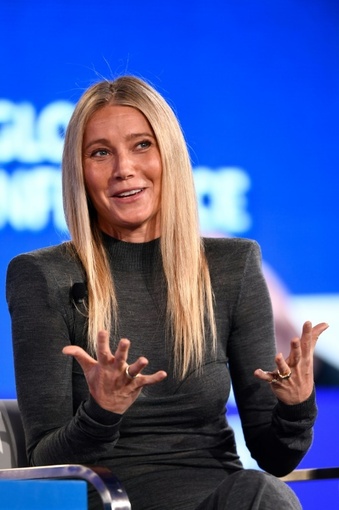For years, the sweeping physical and emotional midlife change that women undergo has been shunted to the shadowy corners of public view, and barely even discussed among friends.
In the United States, menopause is moving off the back burner, in part thanks to Hollywood A-listers who say it's high time to end the taboo surrounding a biological process that affects half the world's population.
Of course, some of those same celebrities have sought to cash in on an as yet untapped gold mine by offering a range of new products aimed at middle-aged women seeking relief.
Naomi Watts, Gwyneth Paltrow and Oprah Winfrey have all recently gone on the record about the symptoms they have experienced. Michelle Obama tackled menopause on her podcast in 2020.

Winfrey, the 69-year-old talk show queen, said her heart palpitations in her late 40s were so severe that she thought she was "going to die every single night."
"I went to five different doctors -- nobody ever once suggested that it could be menopause," Winfrey says, calling for more public discourse to warn women about what is to come, and also to make doctors more aware of the need for better care.
Some doctors appear to be woefully unversed on the topic, or simply embrace the old-fashioned notion that it's a phase to be dealt with and nothing more.
- Better patient care? -
Menopause, which marks the one-year point after a woman's final menstrual period, is actually the end point of a much longer cycle.
Perimenopause is the final phase of a woman's reproductive cycle and is the time when many of the most troublesome symptoms are noticed -- from night sweats and hot flashes to insomnia, hair loss, anxiety, heavy bleeding and low sex drive.
For some women, this phase can last for up to a decade -- hence the need for better awareness, care and consideration.
Studies suggest a vast majority of women will experience at least one menopausal symptom in their lifetime.
Wen Shen, an associate professor of gynecology and obstetrics at Johns Hopkins University in Baltimore and the co-director of its Women's Wellness and Healthy Aging Program, says 20 percent of women with symptoms have "really horrible, severe" issues.
Those experiences during perimenopause can "basically ruin their lives, ruin their ability to focus at work, to concentrate, ruin their relationships," Shen told AFP.
She is in favor of the movement by showbiz power players to destigmatize the condition especially as, in her view, "unfortunately, many doctors are not well versed."
"Traditionally it has been such a taboo. And women were afraid to admit they were in menopause, because it's sometimes shameful. And it was associated with aging," Shen said.
"So I think having glamorous movie stars bringing it out and being honest about it is a good thing."
In 2012, Shen's team did a survey of all OB GYN residents in the United States and found that the majority of graduating residents "did not feel comfortable dealing with menopause."
Some respondents had one lecture about the condition, as opposed to months of training about infertility and gynecological cancers.
Shen says textbooks have been improved in the last decade, but still says there is "not enough emphasis" on teaching the next generation of doctors about an essential phase of a woman's life.
- 'Menopause solutions' -

In October, Watts launched Stripes, which offers "menopause solutions from scalp to vag." On offer are lubricants for vaginal dryness, densifying hair masks and probiotic supplements.
For years, Oscar winner Paltrow has sold "Madame Ovary" -- a supplement cocktail of herbs, vitamins and phytonutrients to "help smooth the menopausal transition." A month's supply goes for $90 on her Goop website.
And retired tennis superstar Serena Williams, 41, recently invested in vegan menopause supplement brand Wile, saying it was "changing the game for women over 40."
One of the standard treatments for menopause is hormone replacement therapy (HRT), which replaces the estrogen that a woman's body stops making as she ages, addressing key symptoms such as hot flashes and protecting against osteoporosis.
Once prescribed regularly, the treatment all but dropped off the map in the United States 20 years ago -- the result of a flawed scientific study that sparked panic by suggesting high health risks to women.
Shen says better research over the past two decades and assessment of the risks has markedly improved understanding of HRT, leading to its increased use, but she worries about companies offering the drugs over the phone.
"Some of them do advise other forms of treatments that are not evidence-based, have not been researched adequately, that may actually be harmful," she warns.
Shen suggests that women experiencing serious symptoms ask their doctor to be sent to someone specializing in menopause care, who would be able to prescribe the proper treatment, including HRT.
iba/sst/ec
© Agence France-Presse
Your content is great. However, if any of the content contained herein violates any rights of yours, including those of copyright, please contact us immediately by e-mail at media[@]kissrpr.com.
Source: Story.KISSPR.com

